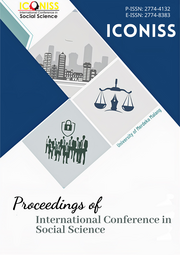Reform Regional Regulations of Malang City in Waste Management
DOI:
https://doi.org/10.26905/iconiss.v3i1.9682Keywords:
Environment, Local policy, Waste managementAbstract
The State of Indonesia is legal, as contained in Article 1 Paragraph 3 of the 1945 Constitution of the Republic of Indonesia. Consequently, every aspect of the life of the nation and state must be based on law. Moreover, Indonesia is a welfare state, so it must find solutions to every problem its people face. One of the problems that must be addressed immediately is the issue of the environment. Environmental problems are issues that are often discussed in the international world. Garbage is one of the topics of the many problems that are often discussed related to the environment, not least in Indonesia. Malang's second largest city in East Java is recorded to have a volume of waste that increases yearly, which is one of the most challenging problems to solve until now. This environmental problem, especially regarding the waste problem in Malang City, must be addressed immediately because the right to a decent living environment is a human right, as stated in Article 28 H (1) of the 1945 Republic of Indonesia Law. The article states, it is said that "Everyone has the right to live in physical and spiritual prosperity, to have a place to live, and to have a good and healthy living environment and have the right to obtain health services. One of the mechanisms adopted in overcoming these problems is presenting legal products in the form of regional regulations in Malang City, which comprehensively regulates waste management. Malang City already has a legal basis regarding waste management, but after substantive analysis, it still has shortcomings and has been unable to overcome the waste management problem. This article intended to provide recommendations in the form of considerations in preparing regional regulations in Malang City regarding Waste Management in the future which is then expected to be able to overcome these problems. The research method used in this study is an empirical juridical (socio-legal) method that looks at real problems related to waste management to be accommodated and analyzed, which will ultimately provide solutions from a legal perspective regarding what things must be regulated in the law. Overcome these problems. The recommendation generated is in the form of consideration of what things must be handled in the Malang City Regional Regulation to overcome the shortcomings of the previous regulation. These include specific waste management mechanisms, household, and similar waste management mechanisms, elimination of levies on waste transportation, financing, incentives, community roles, and sanctions. With this in mind, legal certainty will be presented to resolve juridical issues related to Malang City waste management.Downloads
References
Amelia, D. (2021). No Impact Of The Covid-19 Pandemic And The Urgency For Establishing Regional Regulations Concerning Legal Assistancetitle. Title. 309–323.
Hadita, C. (2020). Regional autonomy political politics of regional liability reports to regional representatives in the implementation of local government. NOMOI Law Review, 1(1), 89–100. https://doi.org/10.30596/nomoi.v1i1.4645
Hanifa, A. A. (2019). Law Politics of Waste Management in Semarang City.
Listiyani, N., & Said, M. Y. (2018). Political law on the environment: The authority of the government and local government to file litigation in Law Number 32 Year 2009 on environmental protection and management. Resources, 7(4), 77. https://doi.org/10.3390/resources7040077
Nurhayati, Y., Ifrani, I., & Said, M. Y. (2021). Normative and empirical methodology in the perspective of legal studies. Jurnal Penegakan Hukum Indonesia, 2(1), 1–20. https://doi.org/10.51749/jphi.v2i1.14
Opoku, A. (2019). Biodiversity and the built environment: Implications for the Sustainable Development Goals (SDGs). Resources, Conservation and Recycling, 141(October 2018), 1–7. https://doi.org/10.1016/j.resconrec.2018.10.011
Prissando, F. A., & Ambulanto, T. (2021). Community participation in waste management in Kediri City following Regional Regulation Number 3 of 2015. Jurnal Mediasosian : Jurnal Ilmu Sosial Dan Administrasi Negara, 5(1), 101. https://doi.org/10.30737/mediasosian.v5i1.1696
Saragih, T. M. (2011). Concept of community participation in formation of regional regulations detailed spatial and regional planning. Sasi, 17(3), 11. https://doi.org/10.47268/sasi.v17i3.361
Sihombing, E. N., & Syaputra, M. Y. A. (2020). Implementation of the use of artificial intelligence in the formation of regional regulations. Jurnal Ilmiah Kebijakan Hukum, 14(3), 419. http://dx.doi.org/10.30641/kebijakan.2020.V14.419-434
Suharjono, M. (2014). Formation of responsive regional regulations in support of regional autonomy. DiH: Jurnal Ilmu Hukum, 10(19), 21-37. https://doi.org/10.30996/dih.v10i19.281
Suparto, S. (2019). Problems with establishing Regional Regulations (Perda) on regional spatial plans for Riau Province. Bina Hukum Lingkungan, 4(1), 79. https://doi.org/10.24970/bhl.v4i1.87
Wicaksono, D. A., & Rahman, F. (2020). Interpreting the Authority to Regulate Regional Governments in implementing government affairs through establishing regional regulations. Negara Hukum: Membangun Hukum Untuk Keadilan Dan Kesejahteraan, 11(2), 231–248. https://doi.org/10.22212/jnh.v11i2.1614
Downloads
Published
Issue
Section
License
Authors who publish in this journal agree to the following terms:
(1)Â Copyright of the published articles will be transferred to the journal as the publisher of the manuscripts. Therefore, the author confirms that the copyright has been managed by the journal.
(2) Publisher of Proceedings of International Conference in Social Science is the University of Merdeka Malang.
(3) The copyright follows Creative Commons Attribution–ShareAlike License (CC BY SA): This license allows to Share — copy and redistribute the material in any medium or format, Adapt — remix, transform, and build upon the material, for any purpose, even commercially.

